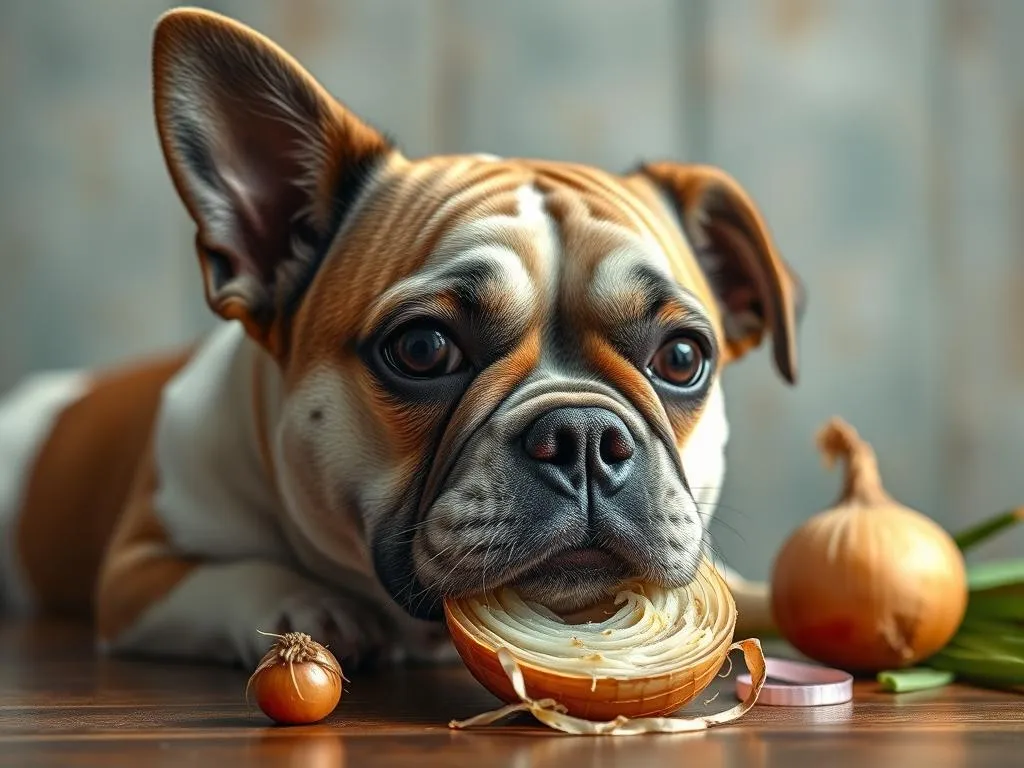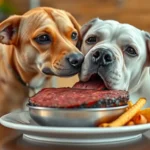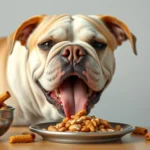
Dog nutrition is a crucial aspect of pet ownership that directly impacts the health and well-being of our canine companions. Just as we must be mindful of our own diets, we need to understand what foods are safe and beneficial for dogs. While many human foods can be harmless or even nutritious for our furry friends, certain items pose significant risks. One of these is onions, which can be highly toxic to dogs. Understanding the implications of feeding onions to dogs can prevent serious health issues and promote a balanced diet.
Understanding Dog Nutrition
Nutritional Requirements of Dogs
Dogs, like humans, require a variety of nutrients to thrive. Their diet should include the following essential components:
- Proteins: Vital for growth, maintenance, and repair of body tissues. Proteins can be sourced from meat, fish, and certain plant-based foods.
- Fats: Necessary for energy, healthy skin, and coat. Omega-3 and Omega-6 fatty acids are particularly beneficial.
- Carbohydrates: Provide energy and help with digestive health. Whole grains and vegetables are excellent sources.
- Vitamins and Minerals: Support various bodily functions. Vitamins A, D, E, and K, along with minerals such as calcium and phosphorus, are crucial for maintaining health.
Dietary needs can vary significantly based on factors such as age, breed, and health conditions. Puppies, for example, require more protein for growth, while older dogs may need fewer calories to maintain a healthy weight. Consulting with a veterinarian can help determine the optimal diet for individual dogs.
Common Myths About Dog Nutrition
There are many misconceptions surrounding dog nutrition, particularly regarding human food safety for dogs. One widespread myth is that all human food is safe for canine consumption. This is not the case. Foods considered healthy for humans can be harmful or even deadly to dogs.
Another common belief is that “table scraps” are a suitable addition to a dog’s diet. While some scraps can be safe, others, like onions, can lead to severe health issues. It’s essential to distinguish between what is truly safe for dogs and what should be avoided.
The Toxicity of Onions
What Makes Onions Toxic to Dogs?
Onions contain a compound known as thiosulfate, which is toxic to dogs. Unlike humans, dogs lack the necessary enzymes to process thiosulfate efficiently, making them susceptible to onion poisoning. The toxicity level can vary based on the type of onion consumed:
- Raw onions: Highly toxic and pose the greatest risk.
- Cooked onions: Still toxic but generally less so than raw.
- Dehydrated onions: Extremely concentrated and dangerous, even in small amounts.
Even small quantities of onions can be harmful, particularly if consumed regularly over time. It’s crucial for dog owners to be vigilant about what their pets eat.
Symptoms of Onion Poisoning in Dogs
The symptoms of onion poisoning can manifest within a few hours to a few days after ingestion, depending on the amount and type of onion consumed. Common symptoms include:
- Vomiting
- Diarrhea
- Lethargy
- Weakness
- Pale gums
- Increased heart rate
If you notice these symptoms after your dog has consumed onions, it’s vital to act quickly, as the severity can escalate based on the quantity ingested.
Immediate Actions if Your Dog Eats Onions
Recognizing the Signs of Distress
Monitoring your dog’s behavior after consuming onions is critical. Look for any unusual signs of distress, such as:
- Sudden lethargy
- Vomiting or diarrhea
- Difficulty breathing
- Loss of appetite
Recognizing these signs early can make a significant difference in your dog’s recovery. Timing is vital, as prompt action can help mitigate the effects of onion toxicity.
What to Do Next
If you suspect your dog has eaten onions, follow these steps:
- Contact a Veterinarian: This should be your first course of action. Explain the situation and follow their advice.
- Inducing Vomiting: Your vet may recommend inducing vomiting to prevent further absorption of the toxin, but this should only be done under professional guidance.
- Activated Charcoal: If instructed by a veterinarian, activated charcoal may be administered to help absorb the thiosulfate in the dog’s system.
When to Seek Emergency Care
Certain situations require immediate veterinary assistance, including:
- If your dog shows severe symptoms, such as difficulty breathing or collapse.
- If a large quantity of onions has been ingested, even if symptoms are not yet apparent.
- If your dog has underlying health issues that may exacerbate the effects of onion toxicity.
Timely intervention is crucial, as it can prevent potential organ damage and other serious health complications.
Safe Alternatives to Onions
Safe Vegetables for Dogs
If you’re looking for safe vegetables to incorporate into your dog’s diet, consider the following options:
- Carrots: High in fiber and vitamins, great for dental health.
- Peas: Packed with protein and vitamins, they can be a nutritious addition.
- Sweet Potatoes: Rich in fiber and vitamins, they can aid digestion.
- Green Beans: Low in calories and high in vitamins, they’re an excellent snack.
These vegetables not only provide nutritional benefits but can also serve as tasty treats that are safe for your dog.
Incorporating Vegetables into Your Dog’s Diet
When introducing new vegetables to your dog’s diet, keep the following tips in mind:
- Preparation: Wash and cook (if necessary) vegetables to make them easier for your dog to digest. Steaming or boiling is often best.
- Serving Sizes: Start with small amounts, especially if your dog is not used to vegetables. A few pieces of carrot or a spoonful of mashed sweet potato is a good starting point.
- Monitoring: Always observe your dog after introducing new foods to ensure they don’t have any adverse reactions.
Consulting with a veterinarian can provide guidance tailored to your dog’s specific needs.
Understanding Dog Diets: What to Include and Avoid
Foods to Avoid for Dogs
Aside from onions, there are several other foods that can be harmful to dogs:
- Garlic: Similar to onions, garlic contains thiosulfate, which can lead to toxicity.
- Chocolate: Contains theobromine, which is toxic to dogs and can cause severe health issues.
- Grapes and Raisins: Can lead to kidney failure in dogs, even in small amounts.
- Avocado: Contains a toxin called persin, which can be harmful to dogs.
Understanding which foods to avoid is essential for maintaining your dog’s health and preventing emergencies.
Creating a Balanced Diet for Your Dog
A balanced diet for dogs should include high-quality proteins, healthy fats, carbohydrates, vitamins, and minerals. Here are some guidelines:
- Quality Ingredients: Choose high-quality dog food that lists real meat as the first ingredient. Avoid foods with fillers and artificial additives.
- Variety: Incorporate a mix of proteins, grains, and vegetables to provide a well-rounded diet.
- Consult a Professional: Regularly consult with a veterinarian or a pet nutritionist to tailor a diet plan that meets your dog’s specific needs.
Maintaining a balanced diet is key to your dog’s overall health and longevity.
Conclusion
Feeding onions to dogs can lead to serious health complications, and it’s essential for pet owners to be aware of this danger. By understanding the nutritional requirements of dogs, debunking common myths about human foods, and knowing how to respond in case of accidental ingestion, we can ensure our pets lead healthy lives. Responsible pet ownership includes being informed about what foods are safe and beneficial for our dogs, as well as recognizing the signs of distress when something goes wrong.
By sharing this information with fellow pet owners, we can collectively foster a community that prioritizes the health and well-being of our furry friends.









